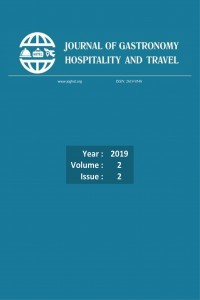Abstract
References
- American Association of Law Libraries (2005). Writing learning outcomes. Available at http://www.aallnet.org/prodev/outcomes.asp. Access Date: 22 March 2018
- Anderson, L.W., & Krathwohl, D.R. (2001). A taxonomy of learning, teaching, and assessment: A revision of Bloom's taxonomy of educational objectives. New York: Longman
- Bloom, B.S., (1956) Taxonomy of educational objectives: The classification of educational goals: Handbook I, cognitive domain. Longmans, Green: New York, NY
- Users’ Guide, ECTS., (2005) Brussels: Directorate-General for Education and Culture
- Mahajan, M., & Singh, M. K. S. (2017). Importance and Benefits of Learning Outcomes. IOSR Journal of Humanities and Social Science. 22(3), 65-67. p-ISSN: 2279-0845
- Maki, P. L. (2004). Assessing for learning: Building a sustainable commitment across the institution. Stylus: Sterling, VA.
- Palomba, C. A. & Banta, T.W. Eds. (2001). Assessing student competence in accredited disciplines: Pioneering approaches to assessment in higher education. Stylus: Sterling, VA
- Stephen, A. (2004). Using learning outcomes-A consideration of the nature, role, application and implications for European education of employing learning outcomes at the local, national and international levels. University of Westminster, Edinburgh
- Stiggins, R. J. (2002). Assessment Crisis: The Absence of Assessment for Learning. Phi-Delta Kappan, 83(10), 758-765. https://doi.org/10.1177/003172170208301010
- Suskie, L. (2004). Assessing student learning: A common sense guide. Bolton, MA: Anker Publishing
- Taras, M. (2005). Assessment- Summative and Formative-Some Theoretical Reflections. British Journal of Educational Studies, 53(4), 466-478. https://doi.org/10.1111/j.1467-8527.2005.00307.x
- Uysal, D., & Seçilmiş, C. (2019). Turizm Fakültesi Öğrencilerinin İngilizce İletişim Becerilerinin Geliştirilmesine Yönelik Gereksinim Çözümlemesine Dayalı Bir Program Önerisi. MANAS Sosyal Araştırmalar Dergisi, 8(4), 3808-3835
- WACSLO, (2017). Writing and Assessing Course-Level Student Learning Outcomes, Office of Planning and Assessment. Texas Tech University. Available at: https://www.academia.edu/36368144/Writing_and_Assessing_Course-Level_Student_Learning_Outcomes_Office_of_Planning_and_Assessment
- Wojtczak, A. (2002). Medical Education Terminology. Medical Teacher, 24(4), 357-357. https://doi.org/10.1080/01421590220145699
EVALUATION OF THE LEARNING OUTCOMES STATEMENTS OF THE ENGLISH COURSES AT TOURISM FACULTIES IN TURKEY THROUGH THEIR WEB-SITES
Abstract
Learning outcomes statements in English courses, as they are true for all other courses, are central to each course. Without having appropriately stated learning outcomes, it is almost impossible to set goals, objectives for the course and to prepare relevant assessment tools for English language practitioners, and thus to teach the target language. Considering that foreign language teaching is a major problem at tourism faculties in Turkey, that tourism students often fail to use the target foreign language, this study intended to examine the course contents of the English courses, specifically learning outcomes considering that they have a guiding role in language teaching. For this purpose, 10 tourism faculties were chosen randomly and their websites were visited by the researcher. The English courses given in the first term was chosen to ensure standardisation in data collection and sampling. It was found with this study that 50% per cent of the visited faculties had no data available regarding the content of the English courses on their web sites. It was also found that the learning outcomes statements of the accessed 5 faculties do not meet the criteria set to state appropriate learning outcomes statements. Relevant conclusions were drawn for complete program development at tourism faculties for effective English language teaching and for the major causes of the failure in teaching English as a foreign language at tourism faculties.
References
- American Association of Law Libraries (2005). Writing learning outcomes. Available at http://www.aallnet.org/prodev/outcomes.asp. Access Date: 22 March 2018
- Anderson, L.W., & Krathwohl, D.R. (2001). A taxonomy of learning, teaching, and assessment: A revision of Bloom's taxonomy of educational objectives. New York: Longman
- Bloom, B.S., (1956) Taxonomy of educational objectives: The classification of educational goals: Handbook I, cognitive domain. Longmans, Green: New York, NY
- Users’ Guide, ECTS., (2005) Brussels: Directorate-General for Education and Culture
- Mahajan, M., & Singh, M. K. S. (2017). Importance and Benefits of Learning Outcomes. IOSR Journal of Humanities and Social Science. 22(3), 65-67. p-ISSN: 2279-0845
- Maki, P. L. (2004). Assessing for learning: Building a sustainable commitment across the institution. Stylus: Sterling, VA.
- Palomba, C. A. & Banta, T.W. Eds. (2001). Assessing student competence in accredited disciplines: Pioneering approaches to assessment in higher education. Stylus: Sterling, VA
- Stephen, A. (2004). Using learning outcomes-A consideration of the nature, role, application and implications for European education of employing learning outcomes at the local, national and international levels. University of Westminster, Edinburgh
- Stiggins, R. J. (2002). Assessment Crisis: The Absence of Assessment for Learning. Phi-Delta Kappan, 83(10), 758-765. https://doi.org/10.1177/003172170208301010
- Suskie, L. (2004). Assessing student learning: A common sense guide. Bolton, MA: Anker Publishing
- Taras, M. (2005). Assessment- Summative and Formative-Some Theoretical Reflections. British Journal of Educational Studies, 53(4), 466-478. https://doi.org/10.1111/j.1467-8527.2005.00307.x
- Uysal, D., & Seçilmiş, C. (2019). Turizm Fakültesi Öğrencilerinin İngilizce İletişim Becerilerinin Geliştirilmesine Yönelik Gereksinim Çözümlemesine Dayalı Bir Program Önerisi. MANAS Sosyal Araştırmalar Dergisi, 8(4), 3808-3835
- WACSLO, (2017). Writing and Assessing Course-Level Student Learning Outcomes, Office of Planning and Assessment. Texas Tech University. Available at: https://www.academia.edu/36368144/Writing_and_Assessing_Course-Level_Student_Learning_Outcomes_Office_of_Planning_and_Assessment
- Wojtczak, A. (2002). Medical Education Terminology. Medical Teacher, 24(4), 357-357. https://doi.org/10.1080/01421590220145699
Details
| Primary Language | English |
|---|---|
| Subjects | Tourism (Other) |
| Journal Section | Articles |
| Authors | |
| Publication Date | December 31, 2019 |
| Published in Issue | Year 2019 Volume: 2 Issue: 2 |


